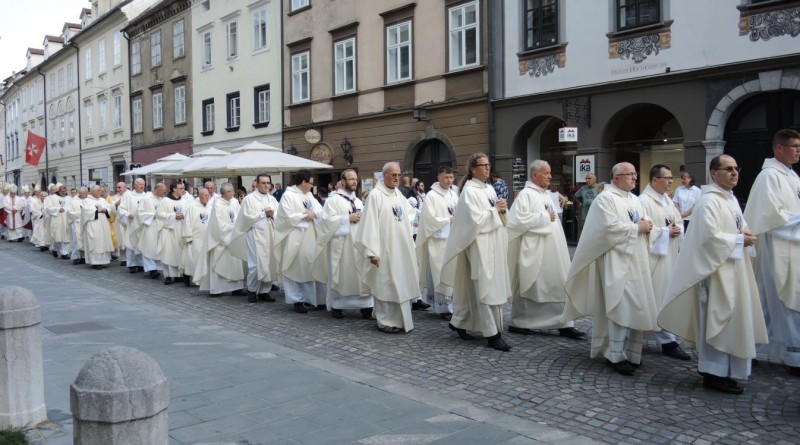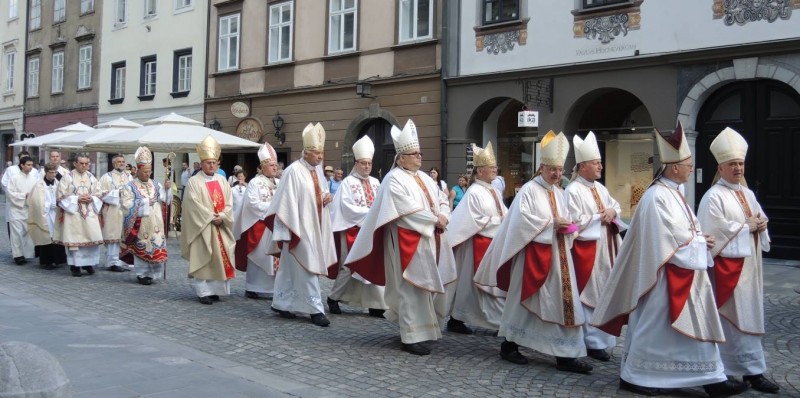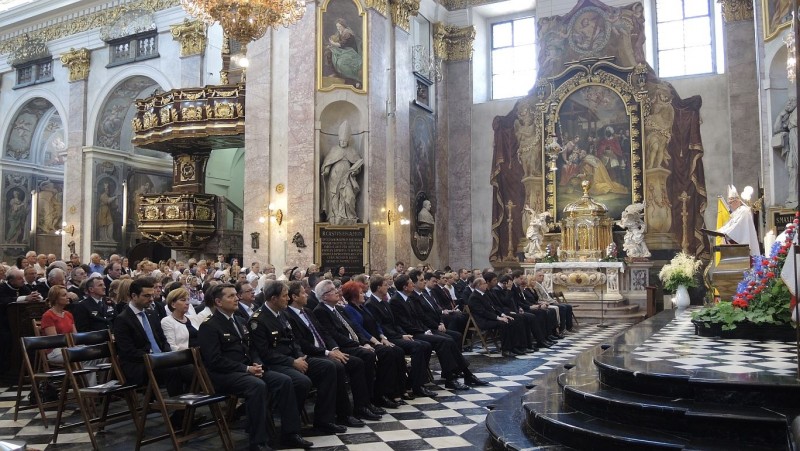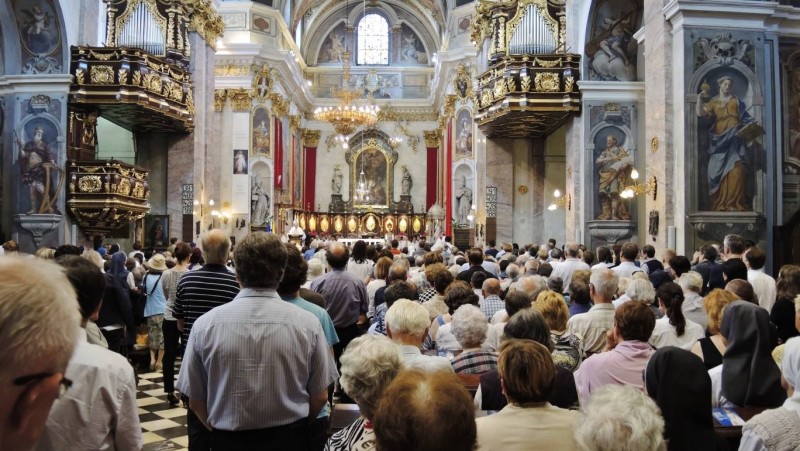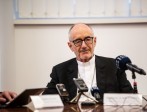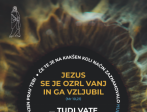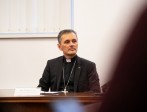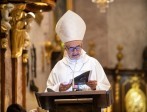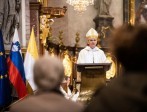Spoštovani bratje v škofovski in duhovniški službi, spoštovani predsednik Republike Slovenije gospod Borut Pahor, spoštovani predsednik vlade Republike Slovenije gospod Miro Cerar, spoštovani predsednik Državnega sveta gospod Mitja Bervar, spoštovane ekscelence, predsedniki političnih strank in predstavniki družbenega in kulturnega življenja, spoštovani predstavniki drugih verskih skupnosti v Republiki Sloveniji, spoštovane sestre redovnice, dragi bratje in sestre.
V stolni cerkvi glavnega mesta države Republike Slovenije smo se zbrali ob praznovanju dneva državnosti, ki ga obhajamo ob 25-letnici osamosvojitve naše države Slovenije. To praznovanje nas navdaja z veseljem in hvaležnostjo.
Z veseljem praznujemo zaradi tega, ker imamo našo državo radi. Morda vsi še ne v zadostni meri, saj je nismo dovolj prepoznali in sprejeli za svojo ter jo ponotranjili. Pa vendar je naša. Kljub zgodovinskim izkušnjam, ki jih imamo z državami. Skozi stoletja smo davek plačevali tujim dacarjem in v vojnah umirali za tuje cesarje, zato naši predniki ne kraljestev, ne cesarstev in ne republik niso v resnici sprejeli za svoje. Težava z nesprejemanjem države se je na neki način vtisnila v naš narodni dedni zapis. Pa vendar je ta država sedaj naša, zato z veseljem in ponosom praznujemo njen rojstni dan.
Praznujemo pa tudi s hvaležnostjo. Ljudje smo navadno veseli in hvaležni tudi za stvari, ki jih pridobimo ali ustvarimo sami, s svojimi sposobnostmi, znanjem, delom in sodelovanjem. Pri naši državi pa ne gre samo za to, da je sad našega prizadevanja in sodelovanja. Če bi presojali zgolj pripravljenost ali željo ljudi po samostojni državi, je bilo te želje kdaj v preteklosti morda celo več, kakor pa pred dobrimi petindvajsetimi leti, ko smo se odločali za samostojnost. Mirno lahko rečemo, da je v tistem času napočil milostni trenutek, ko so bile razmere v evropskem in tudi svetovnem okviru takšne, da so omogočile uresničenje prizadevanja za samostojno in neodvisno državo Slovenijo.
Prav je, da se ob tem spomnimo besed iz Druge Mojzesove knjige, ki smo jih poslušali v prvem berilu. Mojzes je v svojem izgnanstvu pasel čredo v puščavi, ko je v njegovo življenje zagorel grm, ki je gorel, ni pa zgorel. Radovednost ga je odvedla do grma in ob grmu je srečal Boga, ki ljubi svoje ljudstvo in mu ni vseeno, kaj se dogaja z njim. »Dobro sem videl stisko svojega ljudstva, ki je v Egiptu, in slišal, kako vpije zaradi priganjačev; da, poznam njegove bolečine.«
Beseda, ki razodeva Božjo bližino s svojim ljudstvom. Za njegove bolečine ne samo ve, ampak jih tudi pozna. Bolečine ljudstva so tudi njegove bolečine. Potem nadaljuje: »Zato sem stopil dol, da ga rešim iz rok Egipčanov in ga popeljem iz te dežele v lepo in širno deželo, v deželo, v kateri se cedita mleko in med.«
Tako je Bog videl tudi stisko našega ljudstva. Videl je, da na lepotah, ki jih je raztrosil na vse štiri strani, od štajerskih goric do strme tržaške obale, od Triglava do Gorjancev, ne živijo veseli ljudje. Njihov jezik ni bila pesem in njihova pesem ni bilo vriskanje, kakor je zapisal Cankar v Kurentu.
Zato je pripravil zgodovinske okoliščine, ki so našemu narodu omogočile uresničitev hrepenenja po življenju v samostojni državi. V Vzhodni Evropi je sesul komunistični režim, za katerega se je še pred nekaj leti zdelo, da ga nobena stvar ne more ogroziti. Sesuval se je kot hišica iz kart, kar je v resnici tudi bil, saj je svoje temelje namočil s solzami in krvjo milijonov, ki jih je pomoril zato, da bi vzpostavil sam sebe.
Našemu narodu je podaril ljudi, ki so bili dovolj vizionarski, da so uzrli enkratno ponudbo zgodovinskih okoliščin, in dovolj smeli, da so se ob podpori naroda odločili, da priložnost spremenijo v dejstvo. Dobrih deset let pred osamosvojitvenimi procesi je za pastirja Ljubljanske nadškofije postavil nadškofa dr. Alojzija Šuštarja. Ob njegovem imenovanju so se nekateri spraševali, kako bo mogel voditi Cerkev na Slovenskem, ko pa je večino svojega življenja preživel v Švici. Ko je bila slovensko samostojnosti ogrožala jugoslovanska vojska, je bil ravno nadškof Šuštar tisti, ki je neutrudno vzpostavljal stik s škofi, s škofovskimi konferencami, s Svetim sedežem in z različnimi politiki po Evropi, s katerimi se je seznanil in spoprijateljil v službah, ki jih je vršil v Evropi. Čeprav je bilo njegovo imenovanje najprej nerazumljeno, se je v prizadevanju za osamosvojitev in za priznanje samostojne Slovenije izkazalo kot delo Božje previdnosti.
Seveda ni bil edini. Ob njem jih je bilo veliko – še živih in že pokojnih – ki so v odločitev za samostojnost in v uresničenje te odločitve vložili vse; nekateri so v branjenju samostojnosti tudi umrli. Bog naj jim da večni pokoj in jim sveti s svojo večno lučjo.
Bog obljublja Mojzesu, da bo ljudstvu dal deželo, v kateri tečeta mleko in med, deželo blagostanja in obilja. Ko smo se pogovarjali in utemeljevali primernost in potrebnost odločitve za samostojnost, so nam nekateri obljubljali, da bomo v samostojni Sloveniji jedli travo. Hvala Bogu, da so se zmotili. Trave ne jemo, a mleko in med se nam tudi ne cedita. Kje je razlog, da se Božja obljuba o medu in mleku, ali če rečemo v nam bližji metafori – obljuba o slovenski Švici – ni uresničila. Zakaj je danes toliko nezadovoljstva, naveličanosti, brezbrižnosti in vsega drugega, kar hromi razcvet naše države in s tem našega veselja in zadovoljstva v njej.
Mislim, da nam razloge za takšno stanje našteva apostol Pavel v Pismu Galačanom. Ko govori o delih mesa, pravi, da so ta dela med drugim sovraštva, prepirljivost, ljubosumnost, jeze, častihlepnosti, razprtije, strankarstva, nevoščljivosti. Zanimivo je, da večino teh del navaja v množini. Kot bi nam hotel povedati, da ta dela nikoli niso samo skušnjava enega človeka ali ene same strani ali ene same generacije. Vsi nosimo v sebi vstopno točko za dela mesa in ta vstopna točka je napuh – poveličevanje svojega jaza. Po drugi strani pa pravi, da so sadovi Duha ljubezen, veselje, mir, potrpežljivost, zvestoba, samoobvladanje itd.
Kaj danes vedri ali oblači na našem narodnem in državnem nebu? Če samo bežno preletimo merjenja javnega mnenja, vidimo, da pri nas prevladujejo dela mesa, zlasti ljubosumnost, častihlepnost, razprtije in nevoščljivosti. Prav zaradi teh del mesa smo v graditvi samostojnosti naredili temeljno napako, ki nikakor ni nepopravljiva, nas pa kaznuje skozi dolga leta in desetletja. Ko smo namreč uspeli doseči samostojnost in prehod iz totalitarnega režima v demokracijo, smo pozabili, da je premalo državo samo osamosvojiti. Državo je potrebno tudi zgraditi. Premalo je spremeniti družbeni sistem in demokracijo zapisati v temeljne zakone države. Demokracijo je potrebno zgraditi v mišljenju in v vedenju državljanov. To pa je zahtevnejši proces kot vzpostaviti in zavarovati njene meje.
Mi pa smo, namesto da bi gradili državo in demokratično razmišljanje trdno zasidrali v življenje ljudi, začeli na državo gledati kot na fevd, morebiti celo kot na vojni plen, ki si ga je treba razdeliti in čim več koristi pridobiti zase in za svojo skupinico somišljenikov, da ne rečem pajdašev. Namesto da bi gradili, se je začelo plenjenje. Vsi tisti, ki so plenili, pa tudi vsi tisti, ki so to plenjenje omogočili, nosijo moralno in zgodovinsko odgovornost pred našim narodom, ki so ga oropali za sedanjost in tudi za kar nekaj prihodnosti.
Kaj bo torej potrebno v prihodnje? Začeti zidati na skali, kakor je povedal Jezus v evangeliju. Kakor je Evropa zrasla na temeljnih vrednotah krščanstva – temeljni enakosti vseh pred Bogom in s tem tudi pred zakonom (čeprav pred zakonom še daleč nismo vsi enaki) in s tem tudi na temeljnem dostojanstvu vsakega človeka, tako bomo tudi mi svoje sožitje in sodelovanje v tej državi morali graditi na enakosti vseh pred zakonom. Prisluhniti bomo morali besedam kardinala Sodana, ki je bil v času osamosvajanja državni tajnik Svetega sedeža. V Vatikanu je med mašo ob 25-letnici samostojne Slovenije dejal: »Slovenija je danes poklicana, da sprejme Kristusovo sporočilo, kakor je to storila pred več stoletji, ko je bil Kristusov evangelij oznanjen v vaši deželi. Danes bi želel ponoviti sporočilo zvestobe tisti dragoceni duhovni dediščini, ki je vedno zaznamovala zgodovino Slovenije.« Izpostavil je, da se lahko v življenju narodov včasih dvignejo »centrifugalne sile, ki jih razdrobijo«. Zato je pomembno, da Gospoda vedno prosimo, naj nam pošlje svojega Svetega Duha, da nam bo pomagal skupaj graditi pravo civilizacijo, postavljeno na tiste duhovne vrednote, ki jo lahko podpirajo. Samo na ta način bo ta država, ki je naša in se veselimo njenega srebrnega jubileja, za vse nas postala dežela, v kateri tečeta mleko in med.
Ob koncu našega razmišljanja želim še enkrat reči Bogu hvala za zgodovinski trenutek, v katerem je bila samostojnost uresničljiva. Bogu hvala za ljudi, ki so to spoznali in bili pripravljeni zastaviti vse, tudi svoje življenje, da bi se priložnost za samostojnost spremenila v dejstvo. Bog naj bo usmiljen z vsemi, ki so umrli v času, ko je bilo treba samostojnost braniti z orožjem. Na koncu pa še tiha prošnja: Gospod, daj nam modrosti, da ne bomo gradili na sovraštvu, prepirljivosti, ljubosumnosti, jezi, častihlepnosti, pohlepu in nevoščljivosti, ampak na trdnih temeljih spoštovanja in sožitja. Gospod, daj nam zdrave pameti, da bomo videli, kaj nam je v resnično dobro.
Gospod Bog, blagoslovi Slovenijo, ki si nam jo podaril, in blagoslovi vse njene ljudi.
msgr. Stanislav Zore
ljubljanski nadškof metropolit
Homily of Archbishop of Ljubljana Mons. Stanislav Zore at the Solemn Mass for the Country
Brother Bishops and Priests,
President of the Republic of Slovenia, the Honorable Borut Pahor,
Prime Minister of the Republic of Slovenia, the Honorable Miro Cerar,
President of the National Council of the Republic of Slovenia, the Honorable Mitja Bervar,
Excellencies, Presidents of political parties,
Representatives of social and cultural institutions,
Members of Religious Orders,
brothers and sisters,
We are gathered here in the Cathedral church in the Capital city of the Republic of Slovenia to celebrate our Statehood Day on the 25th anniversary of independence of Slovenia in the spirit of gladness and gratitude.
We are celebrating with gladness because we love our country. Perhaps we do not love her enough, as we have not yet recognized her let alone accepted her as our own in the deepest recesses of our inner selves. Nevertheless, she is ours, in spite of historical experiences we have had with various states. Our ancestors were paying taxes to foreign lords and dying for foreign emperors in their wars for centuries, which kept them from ever adopting as their own the kingdoms, the empires and the republics that ruled over our lands. This reluctance to accept any state has been imprinted in our national genes. Nevertheless, this current state is ours indeed, which makes a good case for celebrating her birthday with joy and pride.
We are celebrating with gratitude as well. We are generally joyful and grateful for the things we obtain or create ourselves through our own abilities, knowledge, effort and participation. However, this state of ours is not just the result of our efforts and participation. There had probably been more readiness and desire among our people for an independent state at some point in the more distant past than twenty-five years ago when we were actually opting for independence. We can thus reasonably conclude that this time there arose a moment of grace in the form of circumstances on the European and World stage that brought the efforts for an autonomous and independent state of Slovenia to fruition.
Let us recall the words from the Book of Exodus we have just heard in the First Reading. Moses was in exile tending a flock in the desert when a bush burnt its way into his life, a burning bush that was not consumed. Curiosity led him to the bush, where he encountered God who loves his people and cares about what happens to it. “I have witnessed the affliction of my people in Egypt and have heard their cry of complaint against their slave drivers, so I know well what they are suffering.”
These words reveal God is close to his people. He not only knows about their pain but also knows their pain. The pain of his people is His pain. He then continues, “Therefore I have come down to rescue them from the hands of the Egyptians and lead them out of that land into a good and spacious land, a land flowing with milk and honey.”
This is also how God saw the pain of our people. He saw the beautiful landscapes he had spread between the four corners, from the hills of Styria to the steep slopes of the coast at Trieste, from the Triglav to the Gorjanci, were not inhabited by happy people. Their language was not the song and their song was not the shout of joy that Cankar described in The Kurent.
God therefore prepared the historical conditions that enabled our nation to make its yearning to live in a free country come true. The communist regime in Eastern Europe that had been thought indestructible only a few years earlier collapsed; it fell like a house of cards, which it indeed was, as its foundations were soaked in the tears and blood of millions of people it killed only to establish itself.
God gave our nation visionaries who were able to recognize a unique historical opportunity and bold enough to muster the support of the nation to transform the opportunity into reality. A decade before the movement toward independence started He gave the Archdiocese of Ljubljana a shepherd in the person of Archbishop Alojzij Šuštar. Many wondered at the time whether and how he would be able to lead the Church in Slovenia since he had lived most of his life in Switzerland. When the Yugoslav Army threatened Slovenian independence, it was Archbishop Šuštar who tirelessly communicated with other bishops, conferences of bishops, the Holy See and various politicians throughout Europe, all of them people whom he got acquainted with and befriended while carrying out different assignments in Europe. Although his appointment was at first misunderstood, it turned out to be the work of Divine Providence in favor of the efforts toward independence and international recognition of independent Slovenia.
Of course Archbishop Šuštar was not alone. There were many people who invested everything they had to make the decision for independence come true; some of them gave their lives in their defense of independence. May God grant them eternal rest and shine His perpetual light upon them.
God promised Moses to give his people a land flowing with milk and honey, a land of affluence and plenty. However, when we were discussing and justifying the appropriateness and necessity of our independence, some people suggested that Slovenian independence would reduce us to eating grass. Thank God they were wrong. We are not eating grass, although our land is not yet flowing with milk and honey. What is the reason why the Divine promise of milk and honey or the metaphorical promise of Slovenian Switzerland has not come true? Why do we observe so much dissatisfaction, indifference and apathy today, all of which hinder our prosperity and thus our gladness and satisfaction with living in this country?
I suppose we can find reasons for this state of affairs in the Letter to the Galatians, where the Apostle Paul writes of the works of the flesh, such as hatreds, rivalry, jealousy, outbursts of fury, acts of selfishness, dissensions, factions, and occasions of envy. It is interesting that he uses the plural to enumerate most of them, as if he wanted to say these never pertained to a single person or a single party or a single generation. We are all susceptible to the works of the flesh, as we all bear the seeds of arrogance, haughtiness, and self-glorification. On the other hand, writes the Apostle, the fruits of the Spirit are love, joy, peace, patience, kindness, generosity, faithfulness, gentleness, and self-control.
What could determine today whether the skies above our nation turn out clear or cloudy? A glance at public opinion shows that works of the flesh prevail, particularly jealousy, acts of selfishness, rivalry and envy; these caused us to commit a fundamental error during our movement toward independence, an error that is not incorrigible but has been punishing us all these years and decades. Once we achieved our independence and transition from the totalitarian regime to democracy we forgot it was not sufficient to liberate a country but also necessary to build it. It was not enough to change the system and to write democracy into the constitution and basic laws of the land. Democracy has to become part of the thinking and behavior of citizens. This, however, is a more demanding task than establishing and defending the borders of the country.
Instead of building the state and instilling democratic way of thinking into the lives of the people we started to look upon the state as a feud or even spoils of a war to be divided up for maximal gain of oneself or group of cronies. There was looting instead of building. Looters and those who enabled the looting bear moral and historical responsibility to our nation for robbing it of the present and part of the future.
What do we need for the future? First, we have to build the house on a rock, as Jesus said in the Gospel. Much as Europe was built on the foundation of Christian values, among which are fundamental equality of all before God and thus also under law (although we are far from all being equal under law) as well as the fundamental dignity of every human person, so will our coexistence and participation in this state have to be built upon the equality of all under law. We should heed the words of Cardinal Sodano, who was the Secretary of State of the Holy See during our effort for independence; he said in a mass at the Vatican on the occasion of the 25th anniversary of Slovenian independence: “Slovenia is called to receive the message of Christ today, as it did many centuries ago when the Gospel of Christ was first proclaimed in your land. Today I would like to repeat the message of fidelity to the precious spiritual heritage that has always marked the history of Slovenia.” He pointed out that in the lives of nations there is the possibility for “centrifugal forces, which sunder them.” It is therefore important to ever pray to the Lord to send us of His Holy Spirit to help us build together a true civilization on the foundation of the spiritual values that can support it. This is the only way for this state of ours, whose silver jubilee we are now celebrating, to become for all of us a land flowing with milk and honey.
At the end of our reflection I wish to thank God again for having given us the historical opportunity to achieve our independence and the people who recognized this opportunity and bet everything including their lives to transform the possibility into reality. May God show his mercy to all who died defending our independence. Finally, we ask God to grant us wisdom to build the country not on the basis of hatred, rivalry, jealousy, fury, self-interest, greed and envy, but on the solid ground of respect and coexistence. Lord, give us the sense to see what is really good for all of us.
God bless Slovenia, the land you gave us, and its people. Amen.
Mons. Stanislav Zore
Archbishop of Ljubljana


